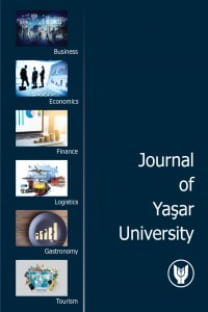KONAKLAMA İŞLETMELERİNDE ÇALIŞAN İŞ GÖRENLERİN KİŞİLİK ÖZELLİKLERİNİN HİZMET VERME YATKINLIĞI ÜZERİNDEKİ ETKİSİ
Hizmet Verme Yatkınlığı / Tüketici-Müşteri Odaklılık, Kişilik Özellikleri
KONAKLAMA İŞLETMELERİNDE ÇALIŞAN İŞ GÖRENLERİN KİŞİLİK ÖZELLİKLERİNİN HİZMET VERME YATKINLIĞI ÜZERİNDEKİ ETKİSİ
___
- Baydoun, R., Rose, D. ve Emperado, T. (2001). “Measuring Customer Service Orientation: An Examination of the Validity of the Customer Service Profile”, Journal of Business and Psychology, 15 (4).
- Bayram, M. (2008), “Elektronik Ticarette Web Site Tasarımının Önemi Türkiye Otel Web Sitelerinin Değerlendirilmesi”, (Yayınlanmamış Yüksek Lisans Tezi), Gazi Üniversitesi Eğitim Bilimleri Enstitüsü Turizm İşletmeciliği Eğitimi Anabilim Dalı.
- Bird, B. (1989) Entrepreneural Leadership, London: Scott Foresman Co. Pub.
- Bozkurt, Ö. “Girişimcilik Eğiliminde Kişilik Özelliklerinin Önemi” http://girisim.comu.edu.tr/dergiall/eskisyilr/1in2/bozkurt.pdf, Erişim Tarihi: 09.04.2012.
- Brown, T.J., Mowen, J.C., Donavan, D.T. ve Licata, J.W. (2002). “The Customer Orientation of Service Workers: Personality Trait Effects on Self and Superior Performance Raitings”, Journal of Marketing Research, 39 (1).
- Can, Y. (2007). A Tipi ve B Tipi Kişilikler Bakımından Mobbing Kişilik İlişkisinin İncelenmesi ve Bir Uygulama, (Yayınlanmış Yüksek Lisans Tezi), Kocaeli Üniversitesi Sosyal Bilimler Enstitüsü, İşletme Anabilim Dalı.
- Carraher, S.M., Mendoza, J.L., Buckley, M.R., Schoenfeldt, L.F. ve Carraher, C.E. (1998). “Validation of an Instrument to Measure Service-Orientation”, Journal of Quality Management, 3(2).
- Chen, Y.J. (2007). “Relationships Among Service Orientation, Job Satisfaction, and Organizational Commitment in the International Tourist Hotel Industry”, Journal of American Academy of Business, 11(2).
- Clifford, M. (1984). Introduction to Psychology, Çev. Hüsnü Arıcı, Ankara: Hacettepe
- Üniversitesi Yayını. Costa, P.T. ve McCrae, R.R. (1992). NEO PI/FFI Manuel Supplement. Odessa
- FL: Psychological Assessment Resources. Cran, D.J. (1994). “Towards Validation of the Service Orientation Construct”, The Service
- Industries Journal, 14(1). Cüceloğlu, D. (2011), İnsan ve Davranışı- Psikolojinin Temel Kavramları, Remzi Kitabevi, Baskı
- Dienhart, J.R; Gregoire, M.B.; Downey, R.G. ve Knight, P.K. (1992). Service Orientation of
- Restaurant Employees, International Journal of Hospitality Management, 11 (4): 331-346. Donavan, D.T. (1999). Antecedents and Consequences of the Contact Employee’s Service Orientation: From Personality Traits to Service Behaviors, (Yayınlanmamış Doktora Tezi) Oklahoma State University.
- Donavan, D.T.; Brown, T.J. ve Mowen, J.C. (2004). Internal Benefits of Service-Worker Customer Orientation: Job satisfaction, Commitment and Organizational Citizenship Behaviors, Journal of Marketing, 68:128-146.
- Franke, G.R. ve Park, J. (2006). “Sales Person Adaptive Selling Behavior and Customer
- Orientation: A Meta-Analysis”, Journal of Marketing Resources, 43 (4). Frei, R.L. ve Mcdaniel, M.A. (1998). “Validity of Customer Service Measures in Personal
- Selection: A Review of Criteration and Construct Evedence” Human Performance, 11(1). Goldberg, L.R. (1990). “The Development of Markers for the Big Five Factor Structure”, Psychological Assessment, 4.
- Groves, J. (1992). Percieved Service Orientation of Restaurant Employees, (Yayınlanmamış Doktora Tezi) Kansas State University.
- Hennig-Thurau, T. (2004). “Customer Orientation of Service Employees: Its impact on Customer Satisfaction, Commitment and Retention”, International Journal of Service Industry Management, 15(5).
- Hoffmann, K.D. ve Ingram, T.N. (1991). “Creating Customer-Oriented Employees, The Case in Home Health Care”, Journal of Health Care Marketing, 11(2).
- Hogan, J., Hogan, R. ve Bucsh, C.M. (1984). “How to Measure Service Orientation”, Journal of Applied Psyhology, 69 (1).
- Holland, J.L. (1976). “Vocational Preferences”, Handbook of Industrial and Organizational
- Psycology, Chicago: Rand Mc. Nally. Holland, J.L. ve Baird, L.L. (1968). “An Interpersonal Competency Scale”, Educational and Psychological Measurement, 28(2).
- Homburg, C., Hoyer, W.D. ve Fassnacht, M. (2002). “Service Orientation of a Retailer Business Strategy: Dimension, Antecendents and Performance Outcomes”, Journal of Marketing, 66 (44). 5273
- ISSN: 1305-970X
- Başlangıç: 2006
- Yayıncı: Yaşar Üniversitesi
BEŞ YILDIZLI OTEL RESTORANLARI MÜŞTERİ MEMNUNİYETİ: ERZURUM İLİNDE BİR ARAŞTIRMA
YAPISAL GÜÇLENDİRME VE PSİKOLOJİK GÜÇLENDİRME ÖLÇEKLERİNİN GEÇERLİLİK VE GÜVENİLİRLİK ANALİZLERİ
OLCA SÜRGEVİL EBRU TOLAY MERT TOPOYAN
AŞIRILIĞIN HABER DEĞERİ: STK FAALİYETLERİ ÜZERİNE BİR İNCELEME
TÜRKİYE DEMOKRASİSİNİN AKSAK AYAĞI: MUHALEFET
GÖKHAN TUNCEL SELAHADDİN BAKAN
RİSKE MARUZ DEĞER HESABINDA KARIŞIM KOPULA KULLANIMI: DOLAR-EURO PORTFÖYÜ
DEMET ÇATAL RAİF SERKAN ALBAYRAK
TÜRKİYE İÇİN ENFLASYONU HIZLANDIRMAYAN KAPASİTE KULLANIMI ORANI TAHMİNİ
